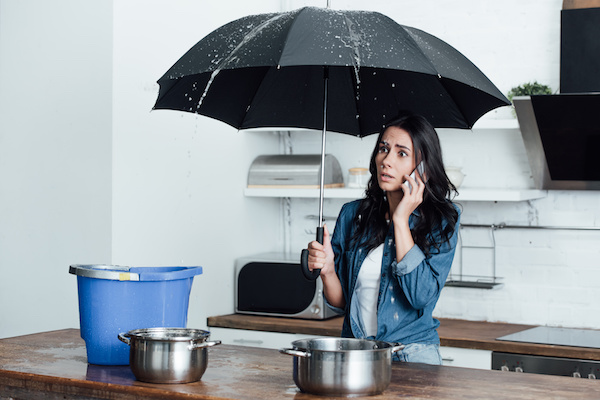Water damage is one of the most common and costly disasters that may befall your beloved house. Even in small amounts, water can deal a considerable blow to your property with extensive damage and mold growth. What’s more, it’s not a threat limited to one season only, and you can expect water leakage at all times.
Fortunately, you aren’t entirely defenseless, and you might be able to take certain steps to prevent the potential damage. There is much you can do: inspect your plumbing and heating system; check water appliances, roof and gutters; test your stopcock; reseal the basement, and consider purchasing a water flow monitoring system
Ultimately, prevention is better than cure, or in this situation, cheaper. Don’t risk draining your wallet with repair costs, and make sure that your beautiful abode remains in one piece. Although, if it comes down to repairs, your existing home warranty coverage may help cover the costs in regards to appliances or heating and cooling systems.
Inspect Your Plumbing and Heating System
You’re probably already familiar with the fact that your plumbing system is a critical aspect of your home. Yet, an unexpected leak may cause all kinds of damage, and you have to know how much it can affect your property.
In fact, a leaky pipe can cause extensive damage, and a small one-inch crack can cost you a pretty penny. Using copper piping is a good decision, as it allows for better flexibility and bends than PVC piping. And if you’re thinking about using plastic piping, then don’t: it’s more likely to burst in freezing temperatures.
Check your water heater to ensure that it’s in proper working order. A leaky heater means you’re deprived of hot water until the issue is resolved. Moreover, a faulty heater may cause an excess buildup of sediment that can clog the drain. If you don’t clean your water heater regularly, it may also result in bacterial growth and unwanted odor. If you plan to buy a new one, bear in mind that it’s not worth trying to diminish the water heater cost by buying something cheaper.
Check Water Appliances
To prevent water damage due to appliances, you should take some precautionary measures. For instance, check water hoses regularly in order to ensure they are free of cracks and holes. Additionally, check whether there are any leaks coming from the faucet or showerhead. If you notice a leak, then you should turn off the water supply immediately and repair or, ideally, replace the appliance.
In addition, you should prevent ice build-up on frozen water pipes. You can do so by insulating them with foam pipes or installing an antifreeze solution in the pipe. You may also want to consider using Caulk to seal any gaps left between the walls and the pipe. If you have an above-ground pool, you should also invest in a pool cover, which will help minimize evaporation during cold weather.
Test Your Stopcock
A stopcock is a device that connects a water supply line to the house water supply line and allows you to turn the water flow on and off. Therefore, if it doesn’t work correctly, it can cause severe damage to your home. To test if everything is fine, turn your stopcock off when the water is running at full force, and wait for at least five minutes before turning it back on again. If everything is in order, there won’t be any leaks. If not, you’ll need to get a plumber to repair the problem.
Re-Seal Your Basement
If you have a basement, then you should pay attention to its flooring and walls. In order to prevent water damage in these places due to seepage through the foundation wall, take preventive measures by filling any cracks or holes with cement mortar. If possible, hire a professional to do the job, as they will know how to identify high-risk areas and apply the suitable sealant.
Additionally, if you have boiler vents in your basement, make sure that they are installed correctly as well. You can verify this by having a professional plumber perform an inspection of your basement.
Consider Purchasing a Water Flow Monitoring System
A water flow monitoring system is an electronic device that monitors water usage within your home. It usually consists of two parts: an electronic sensor (which is usually attached to the main water valve) and a dial gauge that displays how much water has been consumed by the household throughout the day or week.
This information is invaluable when it comes to saving water and lowering your utility bills. Some of these systems are even equipped with alarm systems that will go off when excessive water is being used. Not only that, but it can also help spot a leak early on.
Inspect Your Roof and Drains
Because rainwater and melting snow can cause considerable damage, you should carefully inspect your property to ensure that leaks are not caused by a faulty roof or a clogged drain. In the case of a damaged roof, look for broken or missing shingles and damaged chimney caps. It’s best to get it repaired immediately, as it can lead to serious water damage on the inside of your house.
The same applies to gutters, as a clogged drain may cause excess water to seep into your home. If you notice any leaks or signs of deterioration, you should contact a professional to repair them.
Conclusion
It goes without saying that water damage is a costly issue for homeowners – particularly those who don’t have insurance covering such things. The best way to protect yourself from this kind of disaster is by preventing it from occurring in the first place. Follow the tips provided above and take steps now to protect your home from water damage in the future!

